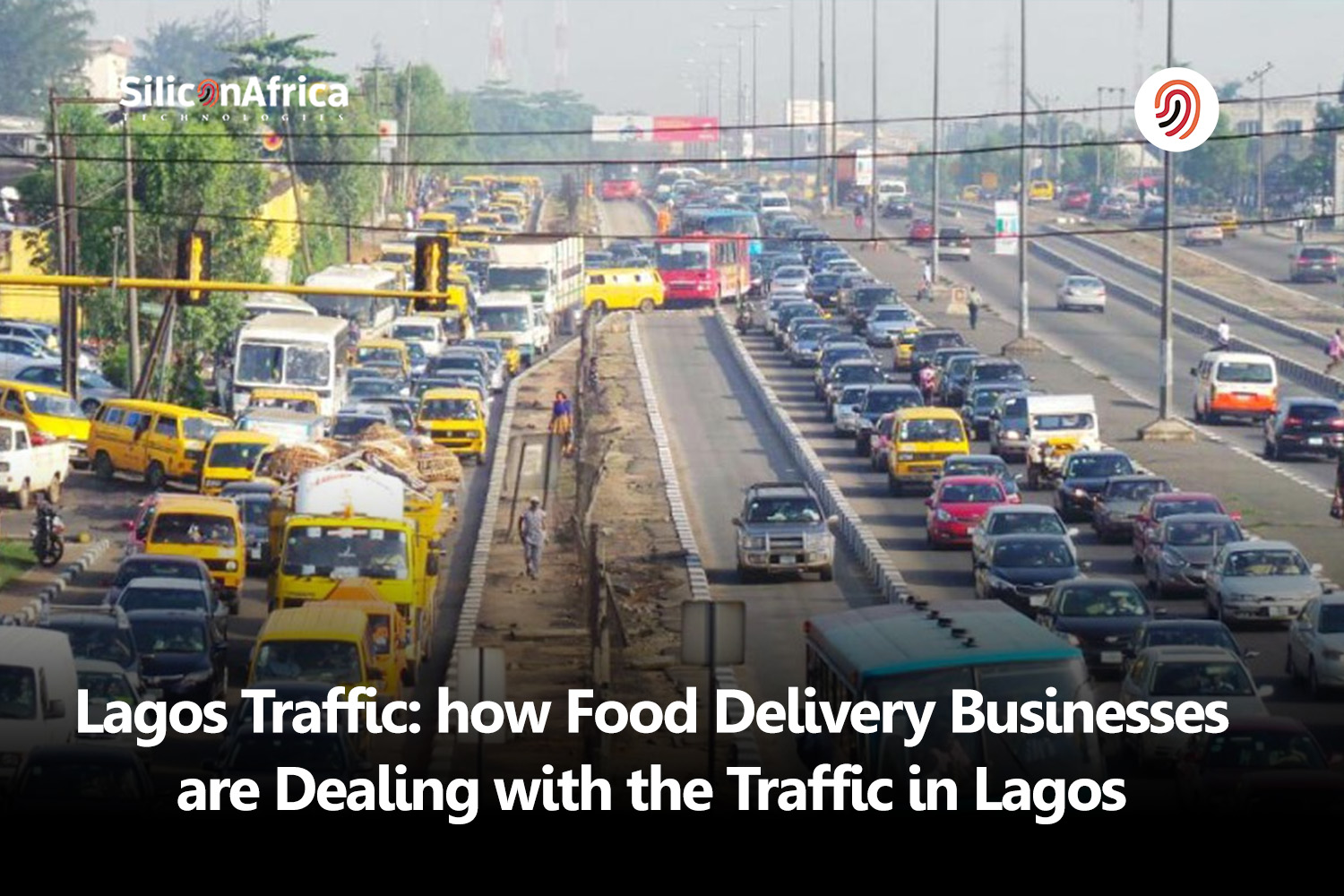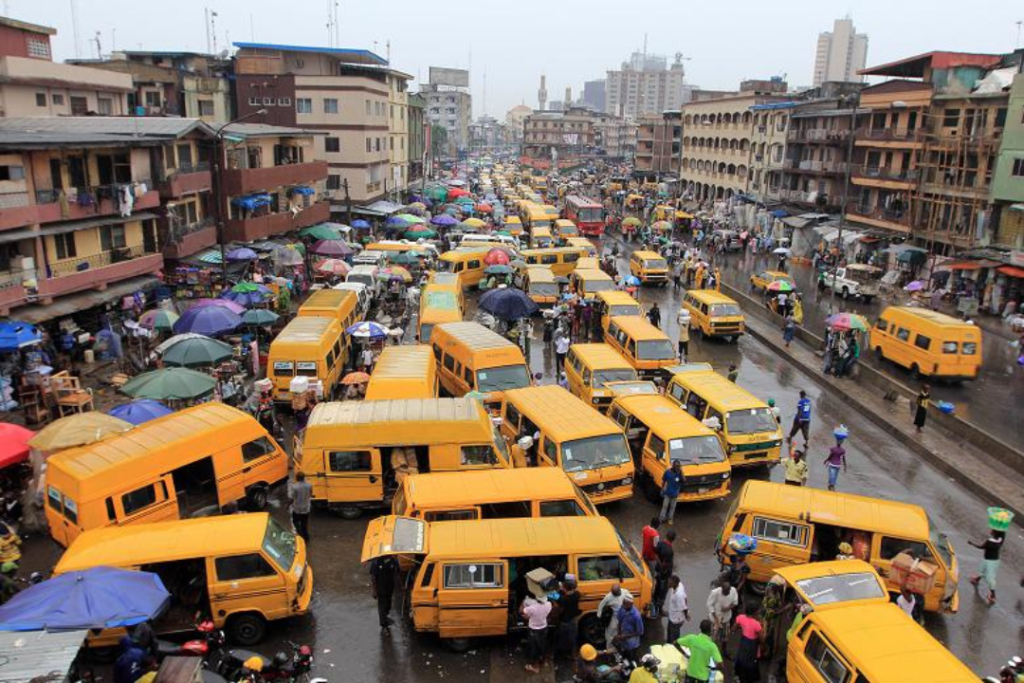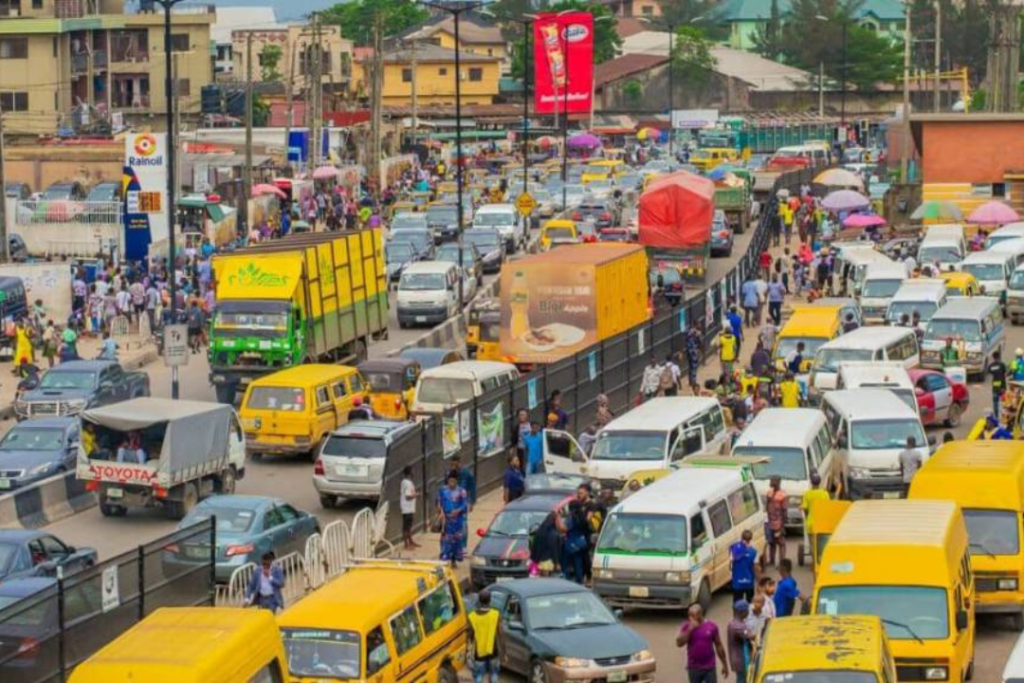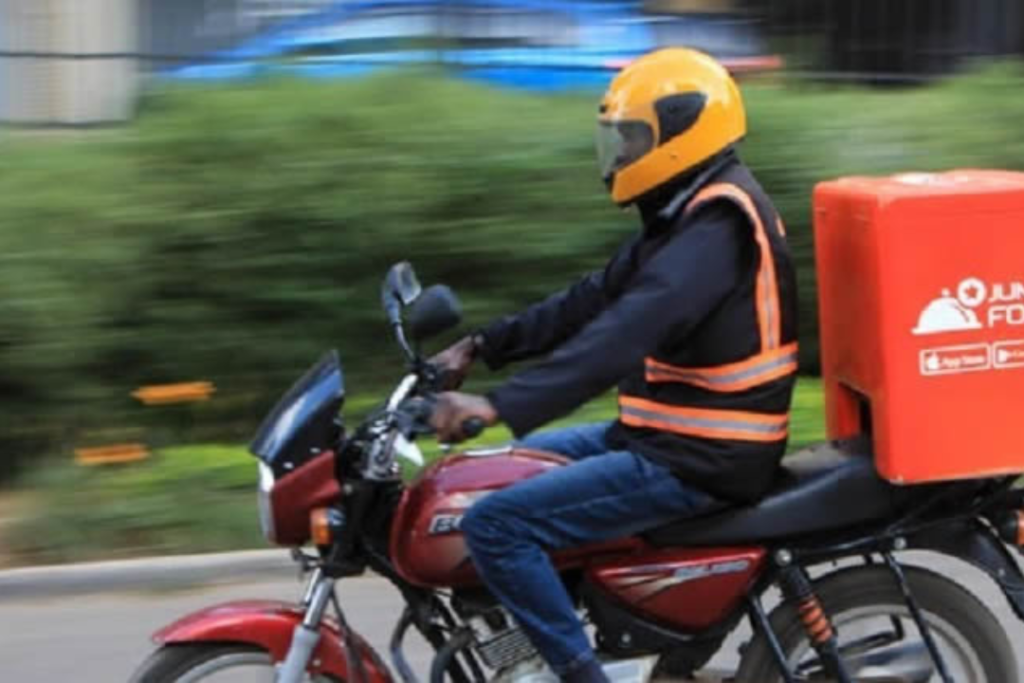Physical Address
60 Ekwema Cres, Layout 460281, Imo
Physical Address
60 Ekwema Cres, Layout 460281, Imo

Navigating through Lagos traffic is no small feat, especially for food delivery businesses. Food delivery in Lagos, a city that is overcrowded and overburdened, is a challenging operation that is sometimes chaotic and frustrating.
Food delivery businesses and their riders must manage poor road conditions, incorrect map directions, and, worst of all, Lagos’ legendary traffic congestion. Most city inhabitants do not expect to order meals online and have them delivered quickly.
Lagos, known for its vibrant culture and bustling streets, also comes with a less appealing companion: traffic congestion. For food delivery services in this bustling city, time is of the essence, and Lagos traffic can be a major roadblock, literally.
But how do they manage? In this blog post, we will go through how the food delivery businesses are dealing with the traffic in Lagos.
It’s a constant battle against the clock, but through strategic planning and local know-how, food delivery businesses in Lagos are proving that they can tackle the challenge head-on, making sure that the city’s traffic doesn’t determine when you get to enjoy your meal. Let’s dive in!
See Also: Jumia Food’s Exit: Four Months After, Former Drivers are Still Jobless Across Africa

Traffic in Lagos, Nigeria, is not just a minor inconvenience; it’s a colossal challenge that uniquely impacts businesses in several ways.
Imagine a bustling megacity, teeming with energy and life, yet its arteries, the roads, are clogged with endless lines of vehicles. This situation turns simple commutes into hours-long endeavors.
For businesses, this means a significant hit to productivity. Employees stuck in traffic cannot contribute to work during those lost hours.
Furthermore, delivery services face nightmares trying to navigate through the chaos, leading to delays in supplies reaching stores or products getting to customers. Such delays can damage reputations and deter future business.
Moreover, the cost implications are steep. The additional fuel spent idling in traffic and the higher vehicle maintenance costs due to wear and tear from prolonged travel times add up, impacting the financial health of businesses.
Thus, the traffic situation in Lagos is not just about the inconvenience; it directly affects how businesses operate, their efficiency, and ultimately, their bottom line. Simply put, Lagos is a magnet for both people and traffic jams.
Related – Chowdeck: a Closer Look into the Fast Growth of the Food Delivery Startup 2025

Ever been super hungry and decided to order your favorite meal, only to be told that it will take what feels like an eternity to arrive?
Welcome to the impact of Lagos traffic on food delivery timelines! Here are ways the legendary traffic in Lagos doesn’t just test your patience but also stretches the waiting period for your much-anticipated meal.
Imagine your food packed, hot, and ready to go, but the delivery guy is stuck in what feels like an endless sea of cars. The slow-moving traffic in Lagos is notorious, often transforming a quick delivery into a lengthy ordeal. So, while your stomach grumbles, your meal is spending quality time getting familiar with the city’s gridlock.
To outsmart the traffic, delivery drivers often have to take longer, less direct routes. These detours might seem like a good idea, but they add extra miles and time to the journey. While the delivery folks dance around the main roads to reach you, your food’s temperature, and sometimes even its quality, starts dropping.
For food delivery businesses in Lagos, predicting delivery times becomes a gamble. What should take 30 minutes might end up being a 2-hour journey. This unpredictability makes it hard for them to provide accurate delivery times, leading to frustration for both the business and hungry customers waiting on their orders.
One late delivery due to traffic can create a domino effect on a delivery person’s entire schedule.
If they’re stuck in traffic with your order, this not only delays your meal but also those of others. It’s like a chain reaction of delay, turning peak hours into a nightmare for food delivery businesses trying to satisfy their Lagosian clientele.
Operating in such a chaotic traffic environment means that food delivery services have to deal with higher operational costs (think fuel and maintenance) due to longer routes and more time on the road. Unfortunately, these costs can trickle down to the consumer, making your order a tad more expensive than you’d like.
In a nutshell, the legendary Lagos traffic does more than just clog roads; it puts a wrench in the works for food delivery timelines, affecting everything from the temperature of your meal to the accuracy of delivery times, and even the cost.
While we can’t make the traffic disappear, knowing what our delivery heroes are up against helps us understand those sometimes inevitable delays.
Patience, as they say, is key, especially when waiting for your food to navigate the busy streets of Lagos. Let’s look at the strategies food delivery businesses employ to deal with traffic in Lagos
See Also: Chowdeck: a Closer Look into the Fast Growth of the Food Delivery Startup 2025
If you’ve ever been to Lagos, then you know that the traffic there isn’t just a simple inconvenience—it’s a full-blown phenomenon. It’s not uncommon for what should be a short trip to become an hours-long journey.
So, in a bustling city where getting from Point A to Point B is a daily challenge, how do food delivery businesses manage to bring your favorite meals straight to your doorstep?
Let’s dive into the creative solutions these businesses have developed to navigate through the notorious Lagos traffic.
First things first, Lagos traffic, affectionately known as go-slow, is infamous for its ability to disrupt plans. For food delivery businesses, this can mean delayed deliveries and unhappy customers. But, they’ve turned to local knowledge and technology to tackle this head-on.
By using traffic monitoring apps and being in constant communication with their riders, they’re able to identify the fastest routes in real-time, making detours around the most congested areas.

In the dense traffic in Lagos, four-wheelers can quickly become a liability. That’s why many food delivery services opt for motorbikes and sometimes bicycles. These smaller, more agile vehicles can weave through traffic much easier than cars, drastically reducing delivery times.
The use of bikes not only ensures hot and fresh deliveries but also keeps the overhead low for businesses, creating a win-win situation for both the customer and the service provider.
Another strategy employed by food delivery businesses in Lagos is the establishment of strategic distribution hubs throughout the city.
Instead of operating from a single central location, these businesses prepare and dispatch meals from various hubs located closer to high-demand areas.
This approach significantly cuts down travel times, as delivery riders start their journeys closer to the delivery destinations, helping them to avoid some of the worst traffic jams in Lagos.
Timing plays a crucial role in maneuvering through Lagos’s chaotic traffic patterns. Food delivery services often schedule deliveries during off-peak hours when the roads are relatively clearer.
Moreover, they communicate realistic delivery times to customers, factoring in the usual traffic conditions. This level of transparency helps manage customer expectations and reduces frustration on both ends.
The food delivery industry in Lagos is growing rapidly, despite the notorious traffic challenges. Through innovative strategies, including leveraging technology, utilizing nimble vehicles, strategically placing hubs, and optimizing delivery timings, these businesses have found ways to thrive.
By constantly adapting to the ebb and flow of Lagos traffic, food delivery services ensure that your meal arrives not just deliciously, but also punctually, making life in Lagos a bit more convenient for everyone.
Read Also – Glovo: The Food Delivery Company Creating a Stir
When thinking about the future of food delivery in the traffic-filled city of Lagos, Nigeria, several trends and developments could shape how people get their meals delivered. Here are a few possible changes that might be on the horizon:
Think about food delivery apps getting smarter and more efficient. Future apps might predict traffic jams and reroute drivers through less congested streets, getting your food to you faster. There could also be drones flying over the traffic, delivering meals straight from the restaurant to your doorstep or office window!
As concerns about pollution and fuel costs rise, delivery services might switch to electric bikes and scooters. These vehicles can zip through traffic more easily than cars and are better for the environment. Plus, they’re quieter, so the city could become a little less noisy.
Instead of getting food delivered directly to your home or office, there might be specific pickup points. These spots would be strategically placed to avoid the worst of Lagos traffic. You’d just walk over to a nearby locker or designated area to collect your food.
Businesses might get smarter about when they deliver food. They could offer discounts for orders delivered during times when the roads are clearer. That means you could order your dinner in the morning, get a cheaper price, and have it delivered before the evening rush starts.
Food delivery services might work closely with city traffic control to better understand and predict flow patterns. This partnership could lead to exclusive delivery lanes or timed access to congested areas, speeding up delivery times even when the roads are busy.
As people get busier, there could be an increase in services that don’t just deliver restaurant food but also offer homemade meals. This trend could encourage a network of home-based chefs, creating a community-centric food delivery model that might bypass some of the traffic challenges faced by traditional restaurants.
Each of these trends represents a way that technology, innovation, and creative thinking could make getting your favorite foods easier, even in a city known for its challenging traffic. While some may seem straight out of science fiction today, rapid advancements mean they could become reality sooner than we think!
Read More: African Agri-Food Startups Invited to Compete for $1 million in THRIVE Global Impact Challenge
In Lagos, known for its bustling streets and hectic traffic, food delivery businesses have found clever ways to ensure your meal arrives hot and fresh, despite the traffic jams.
They’re using technology, like apps, to plan faster routes and even deploying motorcycles that can weave through congestion, making delivery more efficient. These strategies have turned the challenge of Lagos traffic into an opportunity to excel in customer service.
So, the next time you order food in Lagos, rest assured that these innovative businesses have got the traffic figured out, making sure your favorite meals reach you on time, every time.
A state agency in charge of traffic, traffic lights at certain stops, road expansion, and the establishment of alternate routes are all part of the government’s efforts to alleviate the consequences of traffic congestion along all state routes.
Yes, some areas are notoriously difficult for food delivery due to extreme congestion, particularly central business districts and densely populated residential areas. Regions like Victoria Island, Ikeja, and Lekki often face severe traffic in Lagos, making timely food delivery challenging.
To navigate the congested streets of Lagos efficiently, food delivery businesses often use GPS and route optimization software. These tools help to identify the quickest routes in real time, considering the current traffic conditions.
To maintain customer satisfaction, businesses often have policies in place to address delays. This could include compensatory discounts on future orders, free items added to the delayed order, or a complete waiver of delivery fees.